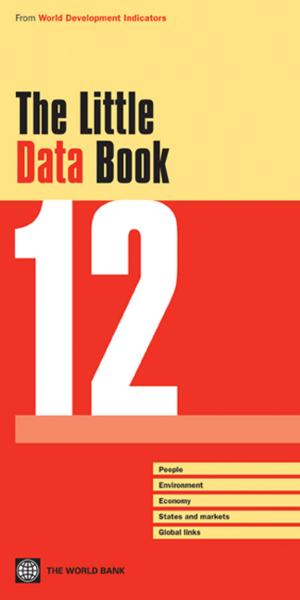Decarbonizing Development
Three Steps to a Zero-Carbon Future
Business & Finance, Economics, Development & Growth, Nonfiction, Science & Nature, Science| Author: | Marianne Fay, Stephane Hallegatte, Adrien Vogt-Schilb, Rozenberg, Ulf Narloch, Tom Kerr | ISBN: | 9781464806063 |
| Publisher: | World Bank Publications | Publication: | June 9, 2015 |
| Imprint: | World Bank Publications | Language: | English |
| Author: | Marianne Fay, Stephane Hallegatte, Adrien Vogt-Schilb, Rozenberg, Ulf Narloch, Tom Kerr |
| ISBN: | 9781464806063 |
| Publisher: | World Bank Publications |
| Publication: | June 9, 2015 |
| Imprint: | World Bank Publications |
| Language: | English |
The science is unequivocal: stabilizing climate change implies bringing net carbon emissions to zero. This must be done by 2100 if we are to keep climate change anywhere near the 2oC warming that world leaders have set as the maximum acceptable limit. Decarbonizing Development: Three Steps to a Zero-Carbon Future looks at what it would take to decarbonize the world economy by 2100 in a way that is compatible with countries' broader development goals. Here is what needs to be done: -Act early with an eye on the end-goal. To best achieve a given reduction in emissions in 2030 depends on whether this is the final target or a step towards zero net emissions. -Go beyond prices with a policy package that triggers changes in investment patterns, technologies and behaviors. Carbon pricing is necessary for an efficient transition toward decarbonization. It is an efficient way to raise revenue, which can be used to support poverty reduction or reduce other taxes. Policymakers need to adopt measures that trigger the required changes in investment patterns, behaviors, and technologies - and if carbon pricing is temporarily impossible, use these measures as a substitute. -Mind the political economy and smooth the transition for those who stand to be most affected. Reforms live or die based on the political economy. A climate policy package must be attractive to a majority of voters and avoid impacts that appear unfair or are concentrated on a region, sector or community. Reforms have to smooth the transition for those who stand to be affected, by protecting vulnerable people but also sometimes compensating powerful lobbies.
The science is unequivocal: stabilizing climate change implies bringing net carbon emissions to zero. This must be done by 2100 if we are to keep climate change anywhere near the 2oC warming that world leaders have set as the maximum acceptable limit. Decarbonizing Development: Three Steps to a Zero-Carbon Future looks at what it would take to decarbonize the world economy by 2100 in a way that is compatible with countries' broader development goals. Here is what needs to be done: -Act early with an eye on the end-goal. To best achieve a given reduction in emissions in 2030 depends on whether this is the final target or a step towards zero net emissions. -Go beyond prices with a policy package that triggers changes in investment patterns, technologies and behaviors. Carbon pricing is necessary for an efficient transition toward decarbonization. It is an efficient way to raise revenue, which can be used to support poverty reduction or reduce other taxes. Policymakers need to adopt measures that trigger the required changes in investment patterns, behaviors, and technologies - and if carbon pricing is temporarily impossible, use these measures as a substitute. -Mind the political economy and smooth the transition for those who stand to be most affected. Reforms live or die based on the political economy. A climate policy package must be attractive to a majority of voters and avoid impacts that appear unfair or are concentrated on a region, sector or community. Reforms have to smooth the transition for those who stand to be affected, by protecting vulnerable people but also sometimes compensating powerful lobbies.















